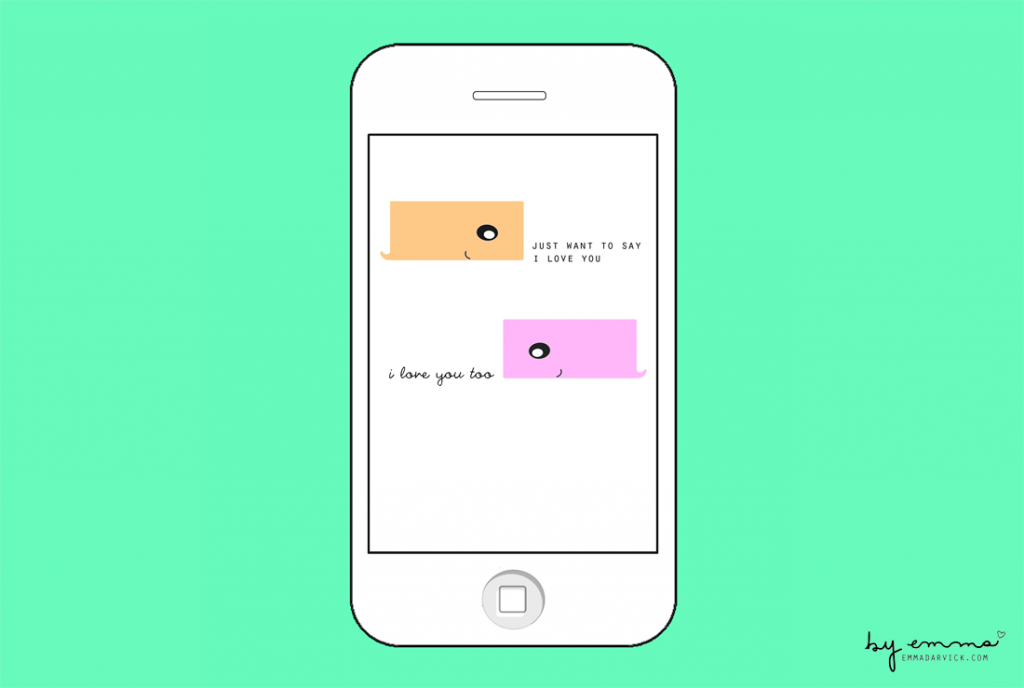Welcome to the latest post in our Closer series — a look at how technology brings couples, family, and close friends closer. Seth and Lori first met as Freshmen at Washington University in St. Louis from which they graduated in 2004. They currently live in Maryland having recently moved from New York City. One of our co-founders was at their wedding – it was awesome.
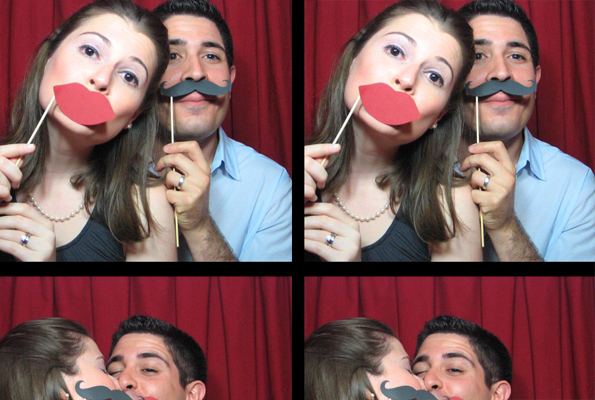
Unbucket: What technology (applications, websites, etc.) brings you closer to each other?
Lori: We use Google Calendar. We basically started off where we tried to share a calendar, but that wasn’t working because I keep an inordinate amount of entries and it was a little overwhelming for Seth to see all my reminders for everything. What we started doing very quickly was we basically made it so I could see his calendar and he could see mine, but we still share events. For example, if we have dinner plans with somebody, whoever made the dinner plans will invite the other person. Because it’s linked to our phones, it’s really easy to access it. I don’t know, Seth and I are together a lot, actually most of the time (laughs). We do text each other all the time.
Seth: Lori consults me for wittiness on her Facebook and Twitter posts.
Lori: Yes, Seth does that, I’m not very funny. We use a lot of the same apps, but it isn’t like we use them together, does that make sense? Seth does more of the research about this stuff and just tells me what to download. I don’t really necessarily go out of my way to look at the new stuff, I kind of wait for Seth to do the research.
Unbucket: So in essence, while the apps don’t bring you closer, the process for you to discover new apps through Seth does.
Seth: Yes, I’m research and development!
Lori: Our phones look pretty similar in terms of what apps we have on them, but I wouldn’t say we necessarily use them together like Google Calendar.
How has your use of technology changed since you first started dating in 2002?
Seth: I think the biggest thing is us both having smartphones. I didn’t even have a cell phone until the first weekend at Wash U and that cell phone couldn’t do anything but call and maybe send text messages.
Lori: The first summer after Seth and I started dating, Seth went to Montreal. I didn’t hear from him for five days straight, I’m not joking, and I was getting a little worried but – I didn’t know if I should have been worried, we had been dating for six months – but to be honest, he really should have called me. Maybe I was just being a girl. Anyway, he came home and he was like, “I’m sorry but my cell phone didn’t work in Canada.” I mean, okay I get that and we still today have problems going across border lines, but I looked at him and I was like, “They don’t have regular phones in Canada?” (laughter)
Seth: Technology has also changed the way the relationship works in the sense that I’m sure back at the beginning of us dating we could go longer periods of time without hearing from each other or making contact. Technology forces you to be more in touch even though it may be a little more impersonal. It’s a weird dynamic.
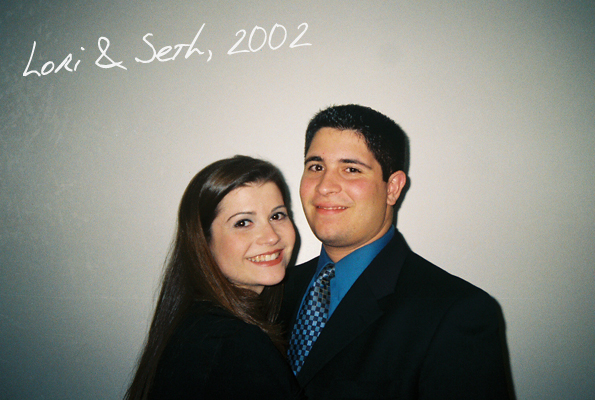
Unbucket: What does it look like when two people go from dating to married in terms of sharing technology?
Lori: Seth and I have not had a house phone since we started living together in 2007. To me that’s a little odd because we’re married, but in order to reach one of us you have to call our cell phones. Every time we fill out a form, any time we sign up for something, we have to give one of our cell phones. Perfect example: we get apartment building emails instead of a note getting put under our door and for a while they were only coming to my email address. I actually had to add Seth’s email address because every time I got an email, I had to forward them on to Seth. It was ridiculous. We do share an email address, at least we thought we were going to. It was setup for some of our wedding stuff. That just became too crazy for us because if somebody went in and dealt with something but the other person didn’t know they dealt with it, it would cause a lot of confusion.
Seth: When we tried doing a joint email it just was a complete failure because one person would read the email and it wouldn’t come up for the other. If there was a way to have an email or some online entity that we both had access to that marks messages as read only for the person who read the message, that would be nice to have.
Unbucket: As a society, do you think technology is bringing us closer or driving us apart?
Lori: It’s changing the way we interact with each other. Listen, you’re talking to someone who as a child went to summer camp for ten summers and I wrote home to my parents and grandparents every single day for ten summers, regardless of whether I was a camper or a counselor. There was a letter sent home every single day. I still call my mom twelve times a day, or my dad. I talk to my sister several times a day. I think technology has just made me contact people more.
A lot of my family is abroad and it’s great to be able to email or share pictures on Facebook and see things they are doing. I remember as a kid, my first cousin and I used to send these long, long letters back and forth to each other. There was always downtime between these letters and now we can send a quick email and it doesn’t even have to be that important like, “Hey, thinking about you, how are you doing?” I don’t have to spend a dollar on a stamp, I don’t have to wait two weeks for a message to get overseas – we now have instantaneous gratification. I’ve connected with a lot more cousins than I normally would have done just by being their friend on Facebook. It’s not that I necessarily talk to them more, but I have somewhat of a sense of what they’re up to, what they’re doing, etc.
For me technology has been a very positive thing, though I can see how it isolates people through the reduction of face time.
Seth: I think technology will make us all closer eventually. I think that technology is always changing, so it’s never perfect. There are certain things we’re forced to do that maybe take longer than they should and maybe a few years down the road that won’t be the case. I think technology has the potential to bring us closer. I also think it has the potential to make you more isolated – it depends how you use it and what type of person you are. If you’re the type of person that’s going to fade off into the corner by yourself anyway, then technology is going to help you do that. If you want to use it to reach out to more people, then you can do that too. I know professionally I’ve made a lot of friends over the past couple years and they don’t live anywhere near me. Using technology to communicate with them has been great. I’ve definitely gotten closer to them than I would have expected in such a short period of time.

Well, this was an inevitable blog post.
Joe Queenan wrote an article in the Wall Street Journal this past weekend entitled, “Boring Bucket Lists Are Nothing to Die For.”
His main point is delivered around the fifth paragraph:
“A bucket list is not some cute, ironic prop for a dubious midlife crisis. A bucket list has the scent of the graveyard about it. Moreover, to possess the moral authority to compile a bona fide bucket list, you need to be as decrepit as Jack Nicholson and Morgan Freeman, the ornery old coots who bust out of the cancer ward in “The Bucket List,” the Rob Reiner film that started the bucket list craze. A bucket list isn’t some namby-pamby Little Things I Gotta Do List, like picking up a quart of milk or calling your mother or buying tickets to see Gretchen Wilson. A proper bucket list is Grim Reaper material.”
We get the question a lot, “Why Unbucket? Is that like, a bucket list?”
This might surprise you, but our response is usually, “No, quite the opposite. That’s why we called it ‘Unbucket.’”
We find the fixation on doing things for the sake of doing things before one dies morbid and misguided. Life should be lived now, today, and in the company of others while one is still living.
That’s what Unbucket is all about.
Queenan writes, “And sorry, nothing personal, but a bucket list should aim a bit higher than seeing Jane’s Addiction in Dallas…”
Well, not so. While we loving seeing lists on Unbucket full of the most adventurous things you can imagine, we’re just as happy when we see the completely achievable and generally unexciting find their way on to an Unbucket list too. We created Unbucket because we fundamentally believe that it doesn’t matter whether you aim high or aim low, as long as it’s with those you care about.
Only yesterday, someone added, “Make my mother make her apple sauce.” A mother and daughter bonding over homemade apple sauce is the fabric of a good life, and we created Unbucket to help millions thread a needle through that fabric over a long and joyous lifetime lived.
So we challenge you: make the most out of everything you do – big and small – and just make sure you’re enjoying it with those you care about most.
Photo credit: sweetbeetandgreenbean
P.S. This is a good place to credit our Mom, Debra Darvick, for actually suggesting the name Unbucket!
If you’ve been following us on Twitter, you know each Sunday we post a bit of inspiration called For the Week Ahead. Today we’ve decided to do a special For the Week Ahead on the Unbucket blog.
Below is an excerpt from a commencement speech penned by Pulitzer Prize-winning author Anna Quindlen. She so captures the spirit that runs through our veins as we build Unbucket that we just had to share it with you.
So here’s what I wanted to tell you today: get a life. A real life, not amanic pursuit of the next promotion, the bigger paycheck, the larger house. Do you think you’d care so very much about those things if you blew an aneurysm one afternoon, or found a lump in your breast? Get a life in which you notice the smell of salt water pushing itself on a breeze over Seaside Heights, a life in which you stop and watch how a red tailed hawk circles over the water gap or the way a baby scowls with concentration when she tries to pick up a Cheerio with her thumb and first finger. Get a life in which you are not alone. Find people you love, and who love you. And remember that love is not leisure, it is work… Remember that you are…still learning how to best treasure your connection to others. Pick up the phone. Send an e-mail. Write a letter.
Welcome to the latest post in our Closer series — a look at how technology brings couples, family, and close friends closer. Leah and Maddie have an extremely close (and uniquely humorous) mother-daughter relationship. Having spent the majority of her life in close distance to her mom and family in New York, Maddie is now on her way to Virginia to begin law school in the fall.
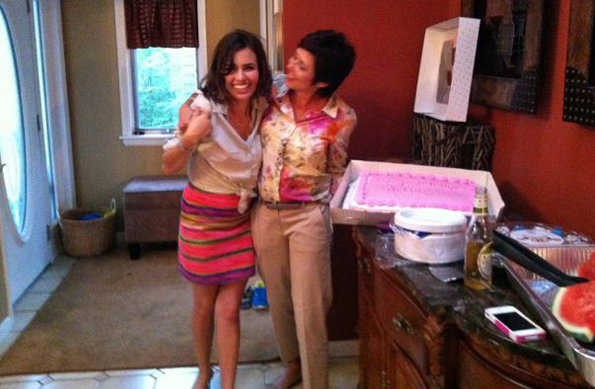
Unbucket: What technology (applications, websites, etc.) bring you closer to each other?
Leah: Cell phones.
Maddie: Yeah, definitely cell phones.
Leah: Well I don’t know about closer, but keeps us in touch.
Maddie: Yeah, I mean I know when I was away, Skype really helped a lot and I suspect we’ll be using Skype a lot.
Leah: And Facetime.
Maddie: And FaceTime. We both got iPhones specifically so that we could FaceTime. At least that’s why I got it. What else mom? Oh, Facebook!
Leah: Yes, Facebook.
Maddie: And we email. We email each other a lot.
Leah: We email, yeah.
Maddie: We send each other things that —
Leah: Sales!
Maddie: Yeah, sales (both laugh) like, “You should check out this sale!” or things that we think are absolutely repulsive that the other should experience for themselves (both laugh again). It’s a good way to share visually when you’re not together.
Unbucket: Tell us more about how you use Facebook to communicate.
Maddie: We do mostly messages.
Leah: I post on your wall, you just never respond!
Maddie: Cause they’re usually things that are frightening or slightly offensive.
Leah: When I post things about my Oreck vacuum and you don’t respond, it hurts.
Maddie: Your passion for your vacuum is threatening your marriage.
Leah: It can lift an eight-pound bowling ball.
Maddie: Yeah, so can dad.
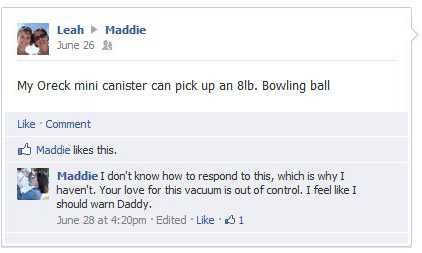
Unbucket: Any additional thoughts on the technology you use to remain close?
Leah: Maddie takes communicating to a whole new level. She’ll be upstairs and will call me on the phone when I’m right downstairs in the kitchen.
Maddie: It’s true! I’m usually doing something and I have a question. Don’t take it out of context mom.
Leah: I’m not, I’m just saying your generation is very dependent on technology.
Maddie: Your generation is very vocal about not being dependent on technology, but you text me way more than I text you. Just saying.
Leah: We’re fighting.
Maddie: We’re fighting…on Unbucket!
Leah: Unbucket this Maddie! (laughter erupts)
Unbucket: How do you see technology facilitating communication once Maddie moves away?
Leah: I think Unbucket is a great tool. Being new to Unbucket, we haven’t fully explored it, but I think that we’ll use it a lot in this process. You can write paper lists down, you can send texts to each other but they get lost — Unbucket is just one site the two of us can go to check things off and add things to together.
Maddie: We’re managing a to-do list together right now which is very, very cool. I’m excited to use Unbucket as an actual bucket list too for when I go to Virginia, as a to-do list of things I want to experience. I think it’s a wonderful way to communicate with friends and family members about things you want to accomplish together.
Unbucket: And beyond Unbucket?
Maddie: I definitely think when I move to Lexington my mom will be locating my iPhone…
Leah: You’re such a jerk Maddie (laughter). Maddie stalks me! She breaks into my calendar on my iPhone —
Maddie: I don’t break into it! The only reason your calendar came on to my iPhone is because we’re both syncing with iCloud. It just showed up on my iPhone.
Leah: So while I’m at the doctor, Maddie sends me a message asking me, “How is Dr. Chutzman?” And I’m like, “How do you know? How do you know his name, how do you know I’m here?”
Maddie: Because you saved it to a calendar that is saved to both of our phones.
Leah: Okay, we’ll I’m not going to put my doctor appointments on Unbucket.
Maddie: Skype will play a really big part. Just any video chatting. I remember talking to a friend who was away at school about this and she actually said, “You know it’s funny, I haven’t seen you in person in six months, but I don’t feel like I miss you like I would normally miss you because we’re able to talk face-to-face just about every day.”
Unbucket: As a society, do you think technology is bringing us closer or driving us apart?
Leah: In one way it brings us closer – I mean my parents, eighty years old, are on Facebook. That’s so cool. My dad reconnected with his camp friends from his childhood. On the other hand, I think that we’ve lost the art of face to face communication. I guess it has helped society as a whole because the lines of communication are there, but I think people are losing their ability to truly communicate.
Maddie: I think that’s absolutely true. A book just came out called The Gaggle and it kind of purports that we live in a post-dating world, and it talks a lot about how technology has influenced that. Technology blurs the way we connect with each other, it blurs boundaries and it blurs categories.
Leah: And it contributes to things taken out of context!
Maddie: Right! I was just talking with someone how I am a very sarcastic person, and when you’re Facebook messaging or when you’re texting, sarcasm doesn’t really carry over.
Leah: It doesn’t work.
Maddie: Absolutely mom. Things can be totally taken out of context, which can cause issues as well. It can create in the midst of increased communication, miscommunication.
Unbucket: Final thoughts?
Maddie: I think technology presents a paradox. In a way, it kind of separates us. Instead of going down the stairs I’ll call my mom –
Leah: And ask, “What time is it?”
Maddie: No! (Laughs)
Leah: “How do you spell my last name?”
Maddie: Gross exaggerations here! (More laughter) But at the same time, it really allows us to be much closer together when we’re far apart. It’s a funny paradox: When we’re together, it separates us, but when we’re separated, it brings us together. It will definitely make this transition a lot easier.
In honor of Independence Day, we offer a tribute to one of the original drafters of the Declaration of Independence, Benjamin Franklin. Not only is Franklin one of this country’s most legendary entrepreneurs, but he was an avid list maker too. In light of this, we’ve humbly interpreted for startups one of his most famous lists, “Thirteen Virtues.”

Thirteen (Startup) Virtues
1. “Temperance. Eat not to dullness; drink not to elevation.”
Compliments, praise, press – these will find their way into your arms with persistence. Indulge a little (it’s good for your confidence) but stay hungry.
2. “Silence. Speak not but what may benefit others or yourself; avoid trifling conversation.”
Want to become a good listener? Stop talking. People will gladly share feedback – don’t get in their way. When you do open your mouth, choose your words carefully. Think about how you can respond in a way that will produce more feedback.
3. “Order. Let all your things have their places; let each part of your business have its time.”
When you’re building a startup, you’re so emotionally invested in your ideas that it’s sometimes difficult to prioritize. Have a good set of guiding questions to help place things in order. For example, “How many users will this actually affect?”
4. “Resolution. Resolve to perform what you ought; perform without fail what you resolve.”
Every day you’ll be presented with a challenge, a doubt, a new competitor – to be resolute means never letting up. Draw inspiration from film, music, and books – American culture worships the resolute.
5. “Frugality. Make no expense but to do good to others or yourself; i.e., waste nothing.”
Whether you’re bootstrapped or funded, be effective with your dollars. This doesn’t mean be cheap. Sometimes the more expensive options are far less costly in the long run.
6. “Industry. Lose no time; be always employ’d in something useful; cut off all unnecessary actions.”
Can you imagine Franklin checking Facebook as he invented bifocals? Take stock of distractions and minimize them. Hat tip to Clay Johnson for writing “How to Focus.”
7. “Sincerity. Use no hurtful deceit; think innocently and justly, and, if you speak, speak accordingly.”
You’re going to need help as you build a startup, but lucky for you, most people are very willing to help out. Just be upfront about what you need and why you need it. If people can’t help you, they often know someone who can.
8. “Justice. Wrong none by doing injuries, or omitting the benefits that are your duty.”
Maybe it’s a given, but you hold in your hands the trust of your users. Do right by them and avoid injuring their credit, their reputations and their mental well-being.
9. “Moderation. Avoid extremes; forbear resenting injuries so much as you think they deserve.”
Building a startup brings with it highs that make you feel invincible, but also lows that make you never want to get out of bed again. Don’t give in to either for too long.
10. “Cleanliness. Tolerate no uncleanliness in body, cloaths, or habitation.”
We’re pretty sure Benjamin Franklin was a UX guy. Always ask yourself if you’re making users’ lives easier or more complicated. Strive for simplicity in everything you do.
11. “Tranquility. Be not disturbed at trifles, or at accidents common or unavoidable.”
Building something from nothing is such an intensely personal experience. Finding mechanisms to step away from your emotions and into a place of calm will help you make more rational decisions.
12. “Chastity. Rarely use venery but for health or offspring, never to dullness, weakness, or the injury of your own or another’s peace or reputation.”
Not sure what do to with this one!
13. “Humility. Imitate Jesus and Socrates.”
No job is beneath you as you build your startup. You are the janitor, you are the recruiter, you have no choice. The less room you leave for ego, the more room you leave for productivity, efficiency and most importantly, learning.
—
Brian and I are both very proud Americans. We’re forever grateful to individuals like Benjamin Franklin for the foundation and principles he put in place for this country. On this 4th of July, we toast Benjamin Franklin, the patron of American entrepreneurs.
Welcome to the latest post in our Closer series — a look at how technology brings couples, family, and close friends closer. Erin and Yvonne are in their late twenties and are the closest of friends. They met while attending college at Washington University in St. Louis and now currently live in separate cities, Erin in Los Angeles and Yvonne in Chicago.
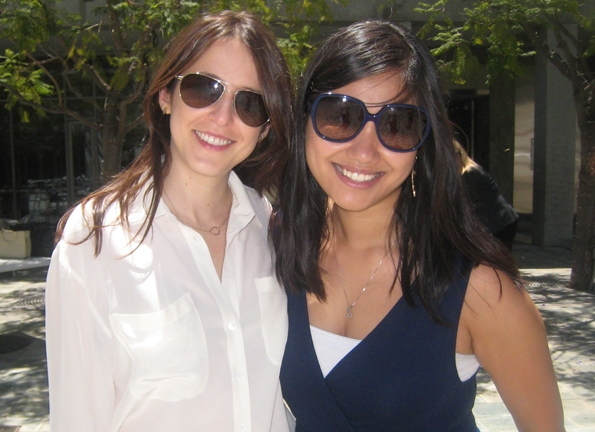
Unbucket: What technology (applications, websites, etc.) bring you closer to each other?
Yvonne: I think for the most part Erin and I only use two or three things to stay in touch.
Erin: Yeah, I was going to say we’re not that tech savvy – or I’m not!
Yvonne: Yeah, we’re not super advanced. I’d say Gchat, texting — before when Erin had a Blackberry we would BBM a lot, that was an easy way for us to communicate throughout the day. I guess Facebook too. That’s pretty much it.
Erin: I don’t know, maybe we haven’t used it as much as I thought, but I’m about to send you a link from my bridal shower to Shutterfly.
Yvonne: Oh okay, photo album websites.
Erin: Yeah, she wasn’t at my shower, and I’m not going to be posting it on Facebook, I’m not one of those people who post everything, so I’d rather just give her a link to see the pictures.
Yvonne: So I can see what happened while I wasn’t there. I guess with important events we do things like that.
Erin: We’re constantly in communication. If I can’t get her though iChat or through text messaging, I’ll go on Gmail and see if she’s there, or vice versa, if she’s not on Gchat I’ll text her.
Yvonne: Yep!
Erin: I know I’ll find her in one of those places! (Both start to laugh)
Yvonne: It’s very rare we’re out of touch. There are weeks where we’re busy and we just say hello over Gchat, but we definitely speak on a weekly basis. I’d say we speak multiple times a week on the phone as well, and I’m not a phone person, I really hate talking on the phone, but with her I do talk on the phone. She’s one of the few people.
Erin: Because she knows I don’t tolerate paragraph text messaging! (Yvonne laughs) I think that’s why there are calls, because you like to send me paragraph text messages and I don’t like that. (Both laugh)
Yvonne: Okay I’m wordy! It’s true. And an email seems too official, you know, like I wouldn’t write you an email, especially when we were using BBM before where I could write a lot.
Erin: And often!
Yvonne: And often! And I think the ‘dings’ would kind of get on Seth’s nerves. (Seth is Erin’s husband)
Erin: And mine! It would be very frequent, but that’s okay. (Yvonne laughs)
Yvonne: The bottom line is we use two to three, sometimes four, different methods of sharing information and sharing our lives through the distance, and I think the reason why we seek out multiple venues is because there isn’t one area or one application to go to that would take care of all those needs.
Erin: Exactly. If we’re on Gchat and she wants me to see a picture of something, she directs me to Facebook. If she wants to show me a picture, it’s not like she’s going to email me a picture already on Facebook. She’ll just tell me to open up Facebook and look at the photo.
Yvonne: And if it’s private, I would have to send the link to a Kodak gallery or something that’s only limited to people to who I send that email too.
Erin: If I there was a Facebook/Gchat-like platform that was just between us then it would reduce the number of platforms we would use.
Yvonne: In terms of planning trips to see each other, those are just whole separate emails and multiple conversations that we have in terms of coordinating plans. We were just on the phone talking about things that we’re going to do when I come in early before the wedding.
Erin: I’ll probably now send out an email, but we’ll talk about it on the phone more too.
Yvonne: And then we’ll probably Gchat. There will always be multiple steps!
Unbucket: We have to say, you’ve developed an incredible, multi-layered system for keeping in touch with each other.
Erin: (Both laughing) It’s like I know where to find her. If she’s not answering this one, she’ll be over here, but if she’s really busy and she’s not on any of these things, then she’s definitely busy.
Yvonne: I have been! I’ve definitely been really busy lately! (More laughing)
Unbucket: How does privacy factor into the technology you use to connect with each other?
Yvonne: Erin said something I wanted to bring up too. She said she wasn’t going to post the photos from her shower on Facebook, and for me and probably a lot of us, there’s this love-hate relationship with Facebook. There are a lot of people online that you’re friends with that you want to share certain moments with, for instance, one of our friends is in South America and she’s really removed from everything that’s going on here. You want her to be able to see what’s going on here, but with Facebook, you’re showing that to hundreds of other people that have no business looking at your photos.
Erin: To add to that, I could put photos on Facebook and limit who sees it, but for just some reason if it’s a private thing or related to my wedding — I don’t want to post any of my wedding pictures on Facebook. I think Facebook is something to be careful with. Maybe for things that are not that meaningful, like, “I went on this vacation,” or whatever, but big life moments or things that are little more private, I don’t know, I think I’m in the minority because most people post this stuff, I just feel a little exposed and I think it takes away from the event a little when everyone has access. Obviously I didn’t invite everyone to my wedding so maybe people I didn’t invite would feel offended. At least with Shutterfly people wouldn’t even know to look for my albums. I feel like Facebook is less about sharing with individual people as opposed to putting your life on blast.
Unbucket: As a society, do you think technology is bringing us closer or driving us apart?
Erin: I think it’s both. I hate to do that, but I think it is. People are very up-to-date on your day-to-day activities: you can share pictures, families can see baby pictures every day of their grandchild’s life and not have to wait to the two times of years they come out to visit, etc. The amount of substance within each communication is a lot less because you know you’re going to talk to them soon and more frequently, so I don’t think you try to fit in as much in each conversation. It’s more a text here or there, so you don’t sit down to have a conversation with someone anymore. You don’t have to sit, you can just speak while you’re getting your nails done or while you’re driving. Maybe not as much attention gets paid to the conversations we have because perhaps we take them for granted. I’m not anti-technology, I just think we don’t take as much time for each other.
Yvonne: Growing up, my grandparents didn’t live in the country, so I didn’t have much access to them. They would have to rely on pictures a few times a year or very infrequent visits. Now my cousin just had a baby and literally they post pictures all the time, or my aunt emails pictures on a daily basis to my mom and we’ve watched him grow day-by-day. That’s a wonderful thing and I would never want to give that back.
I think with other relationships it can become more diluted. With the ones you really care about though, I see mainly positive things, like the system Erin and I have developed for connecting with each other. I don’t think the use of technology has diluted my relationship with Erin or that our conversations aren’t as fulfilling as they were before.
I do think technology can make us lazy with certain people who you really want to keep in touch with but you don’t necessarily have the time to reach out to as often as you’d like. It becomes more about text messaging or a wall post, you know, that type of communication, it’s like a “Hey, I’m thinking about you!” Which is great, but because it’s so easy it’s not part of our regular practice anymore to sit down and write a full email update or schedule a half-hour call. I think with particular friends I make more of an effort to do that. For others, it doesn’t mean those people mean less to me, but I will sometimes take the easy way out and in that way I think technology has diluted those relationships. That said, it’s better than not communicating at all!
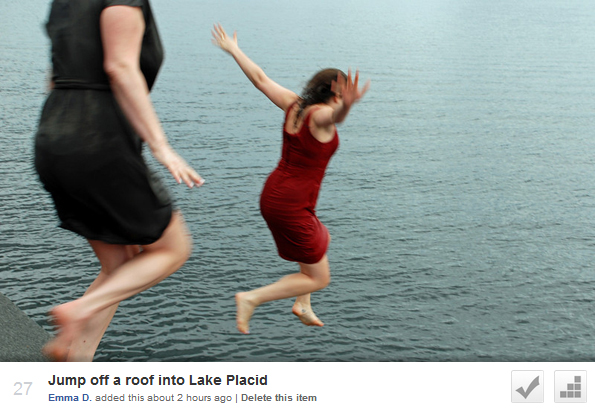
On the very first day of the season, we pronounce Unbucket the “Official App of Summer.”
You: Uh, can you just claim that?
Unbucket: Why not? We Googled it and no one else has.
You: Okay, tell me more.
Gladly. Read on in your best Don Draper voice.
Summer is a finite substance to be cherished and savored like a bottle of Johnnie Walker Blue Label. To really get the most out of summer, you need to embrace its potential and plan ahead while still leaving enough room for chance encounters with dawn. You need to wake up the person next to you, right now, and have them swear to you this summer will be like no other. You need an Unbucket list packed with everything you want to do and will do — shared with the people you care about most.
So that’s our pitch. Unbucket, The Official App of Summer.
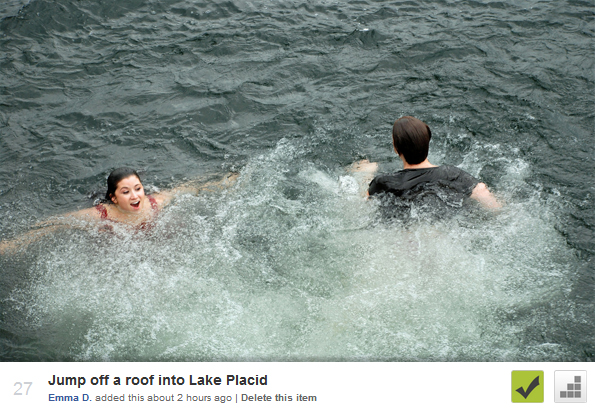
Okay, now switch to your best, most reassuring disclaimer guy voice.
*Although Unbucket claims to be the “official” app of summer, we can’t actually back that up. At no time has summer actually endorsed Unbucket; in fact, summer has yet to return our calls.
Still reading? Here’s your beta invite code to start the summer off right: Summer (limited to 25)

To those of you out there still looking for a Father’s Day gift, may we offer something free, perpetually rewarding, and designed to bring you closer to the person you share it with? We’re talking about an Unbucket list of course. Giving the gift of an Unbucket list to your dad is a commitment to sharing future time together over experiences, big or small. Shared time is the core fabric of what keeps us close, and memories are what live on decades beyond when shared time is no longer an option. An Unbucket list ensures the creation of both.
Use the code “ilovedad” to gain access to Unbucket (limited to 25 people) and send an invite to your dad today. If you feel like it, let us know in the comments what you’ll be adding to your list. Happy Father’s Day!
Welcome to the latest post in our Closer series — a look at how technology brings couples, family, and close friends closer. Christina and David are in their twenties and currently in a long-distance relationship. They both lived in New York City when they first started dating, but for the past year David has been living in São Paulo, Brazil while Christina remains in New York City.
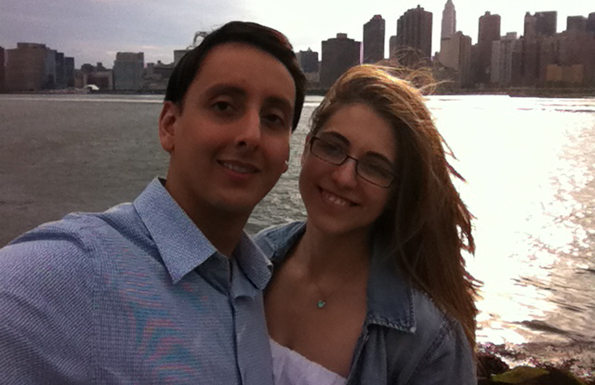
Unbucket: What technology (applications, websites, etc.) bring you closer to each other?
Christina: The two things that we use the most are Skype and Kik Messenger. We use Skype to see each other as much as possible but we use Kik Messenger 24/7, just to send quick messages, to update each other on what we’re doing. It’s always with us.
David: Kik was actually something you introduced us to Elliot. Before that I was using WhatsApp and Viber, but I actually really like the functionality of Kik. As Christina said, it’s real time, so whenever something important is happening in one of our lives, or we make an observation in our daily lives, we can share that with each other. It’s a great way to stay close when you live an ocean apart from each other. We’re trying our best at maintaining a long-distance relationship and technology really helps.
Christina: Kik is great because I can even see when he’s typing — it’s that instantaneous. It’s almost as if we’re having a face-to-face conversation because it’s so fast.
David: Sometimes we find ourselves randomly emailing each other, but I’m not sure what the protocol is because sometimes we’re emailing each other, sometimes we’re using Kik. I don’t really know why we do that when we can use Kik all the time! But something Christina mentioned about Kik — being able to see that the other person is typing – it really does make you feel closer because you feel like the other person is on the other end. Although it’s not a true connection, it’s a stronger connection through Kik.
We also used to play games. We don’t play so much, but we used to play Words with Friends a lot. Not so much since I’ve moved to Brazil, but actually when we were living at home. That was something we really used to share together. It got a little too competitive! (Both laugh)
Christina: Actually, that became part of a sad point when he left because we used to play Words with Friends all the time together, and then when he left, you know I had other games with other people, but it was like, I needed some time away from Words because it was such an important part of our lives together. It was really interesting, it became so sentimental.
David: We could play right now, we have the capability – but we just haven’t gotten back into it. I think I’m ready Christina, are you?
Christina: (Laughs) I’m ready to take you on.
Unbucket: Could you imagine being in your long-distance relationship without access to the technology you have today?
Christina: I think it would just be really different. It’s hard to imagine it without the technology because it’s such an important part of our relationship. Seeing him on Skype is so different than if it was fifty years ago and we only could write letters back and forth to each other. It’s really hard to imagine without the technology.
David: I completely agree. It would be much, much, much harder to have to write letters or spend a lot of money on international calls or something like that, so technology really facilitates interaction and makes this situation a lot more cost effective. Just the fact that you can see the person really, really makes a big difference. I just can’t imagine how difficult it would be without being able to see Christina pretty much on a daily basis.
Unbucket: How does privacy factor into the technology you use to connect with each other?
Christina: Well, I worry a little bit because everything we do is over the internet. All our conversations, whether it’s written over Kik or video over Skype, it’s all there. You wonder, where is this information, who can see it, who can access it. It’s more of a passing thought in the back of my mind, but I don’t worry about it too much. There is so much information out there, what would they do with it? It’s just our personal lives. It’s not a big deal really. But it is a thought in the back of your mind.
David: I don’t really think about it that much either. I think it just goes with technology these days. We’re putting a lot of trust into these companies. I don’t know who the founders of Kik are or if they’re reading our personal messages, but we all place a certain amount of trust into this technology. To me it’s worth it because the benefits really outweigh the cost of potential privacy issues.
From another perspective, with Facebook, Christina and I tend to be a little bit more conservative with what we share. We tend to keep our “virtual PDA” between us. We may every once and a while say something publically, but I think it’s really best said in private whether that’s over Kik or over the phone or when we’re in person. I almost think it gets a little out of hand with over-sharing between people and couples, or just people in their daily lives. People tend to lose sight of what they’re sharing and who gets to see all of their personal moments over a medium such as Facebook.
Christina: I agree. I definitely try to keep personal, personal stuff off of Facebook. I don’t think all the random contacts I have should know or care about the really personal things that should be kept private.
Unbucket: Are there any non-traditional ways you are staying connected through technology?
David: Christina is really into Yoga and is a yoga instructor, so something Christina and I are going to try pretty soon is doing yoga over Skype on an occasional morning.
Christina: Once a week!
David: Once a week! (Christina laughs) It’s my promise to her. Christina and I also like to send – same with you Elliot, please don’t get jealous – songs to each other.
Christina: It’s not the same kind of music bond that you and Dave have, so don’t worry. (Editor’s note: Elliot and David used to have a radio show together…wait for it, wait for it…)
David: Falafel Beatz!
Unbucket: Final thoughts?
David: With technology, as much as we tend to share and do things over the internet or applications, Christina and I do send each other hand-written cards and things like that. I think a hand-written note, even though it may seem a little out-dated, still resonates between the both of us.
Christina: Man, definitely. It’s still really special to send stuff and to get stuff from him.
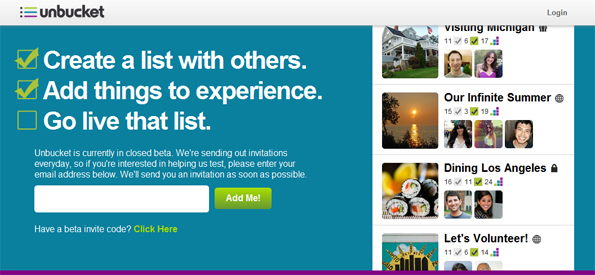
We are proud to announce that just after midnight on June 5, 2012, we launched Unbucket in private beta! After much hard work, we are finally ready for people to take it for a spin. If you’d like to add yourself to the invite list, just visit unbucket.com and enter your email address. We’ll give invites out on a first-come first-served basis as they become available. We are looking forward to receiving great feedback from our beta users so that we can release an even better product to the general public.
On that note, we could not have made it to this point without the support of an incredible group of individuals that we’re grateful to have in our lives. You know exactly who you are.
Best,
Brian & Elliot

